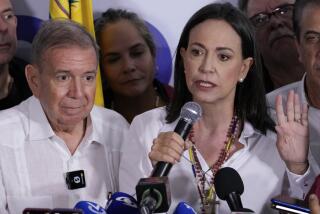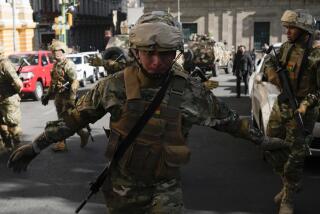Ivory Coast’s president-elect says his troops are outside key city
- Share via
Reporting from Johannesburg, South Africa — The internationally recognized winner of Ivory Coast’s disputed presidential election said Thursday that his forces were outside the nation’s commercial capital, Abidjan, after taking control of much of the country, and he called on his rival’s army to join him.
“It is time to rejoin your brothers-in-arms of the Republican Forces. The country is calling you,” Alassane Ouattara, who won a United Nations-certified election in November, said in a television address.
Ouattara said the aim of the offensive was to remove incumbent Laurent Gbagbo, who has refused to relinquish power, and restore democracy. Gbagbo was reported by RTI state television to be safe in his home in the Abidjan neighborhood of Cocody.
“Despite numerous appeals to Laurent Gbagbo and his allies for a peaceful transfer of power, the only response to this outreached hand has been violence,” Ouattara said.
Amid reports of army units deserting or changing sides in other parts of the country, the only choices left for Gbagbo appeared to be either fleeing into exile or fighting in Abidjan, his strongest source of support. Troops loyal to Ouattara on Wednesday seized Yamoussoukro, the capital.
Gbagbo’s strongest weapon, his control of the army, appears to be disintegrating: His army chief of staff, Gen. Philippe Mangou, deserted Thursday and sought refuge with his family at the home of the South African ambassador.
But a Gbagbo advisor based in Europe reportedly said the incumbent would not step down.
“He will not resign in the wake of this attack. He is not going to abdicate. He is not going to lay down his arms. He will stay in power to lead the resistance to this attack against Ivory Coast organized by France, the United States and the United Nations,” said advisor Toussaint Alain, according to the Associated Press.
Ouattara, whose forces have also seized the key cocoa-exporting port of San Pedro, has been stationed in Abidjan’s Golf Hotel since December, surrounded by Gbagbo’s army but protected by U.N. peacekeepers. In February, he set up a television station in the hotel, on which he has regularly addressed the nation. His forces have surrounded the city.
Abidjan is deeply polarized, with some neighborhoods already in the hands of anonymous anti-Gbagbo rebels who launched attacks in late February. Some of them, in military uniforms, appear allied with Ouattara’s forces, but the allegiance of other ragtag rebels is less clear.
Gbagbo’s opponents say his main military support consists of his volatile youth militia, the Young Patriots, along with other deeply loyal forces numbering at least 5,000.
Nearly 500 people have been killed in the violence in recent months, according to the U.N., and as many as 1 million have fled their homes.
More to Read
Sign up for Essential California
The most important California stories and recommendations in your inbox every morning.
You may occasionally receive promotional content from the Los Angeles Times.













